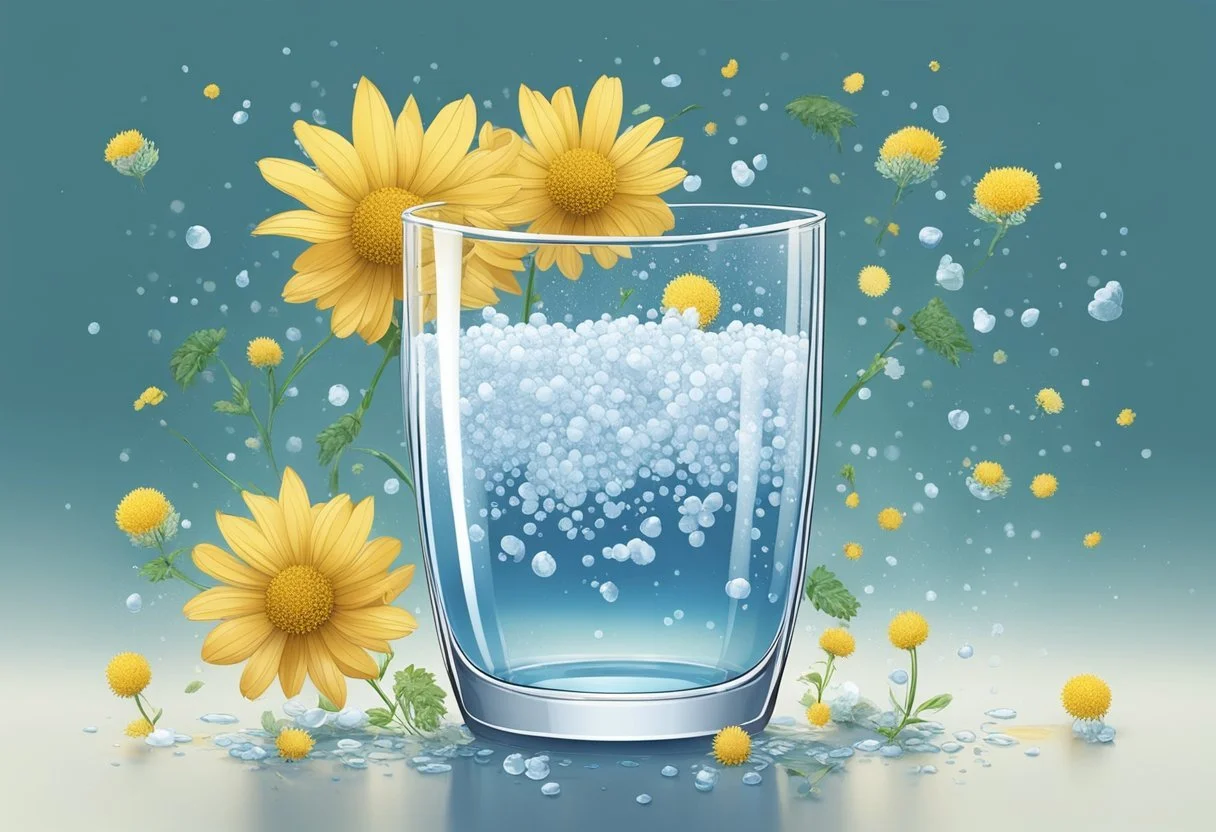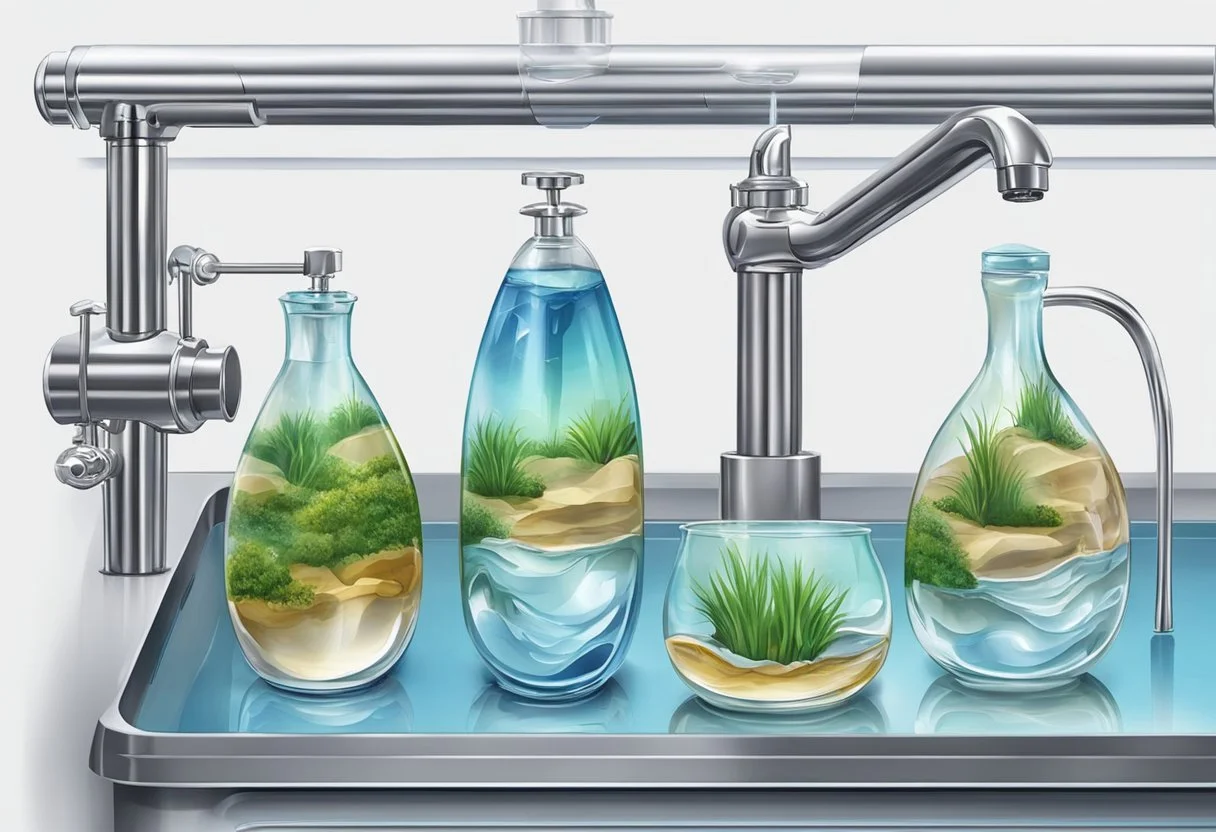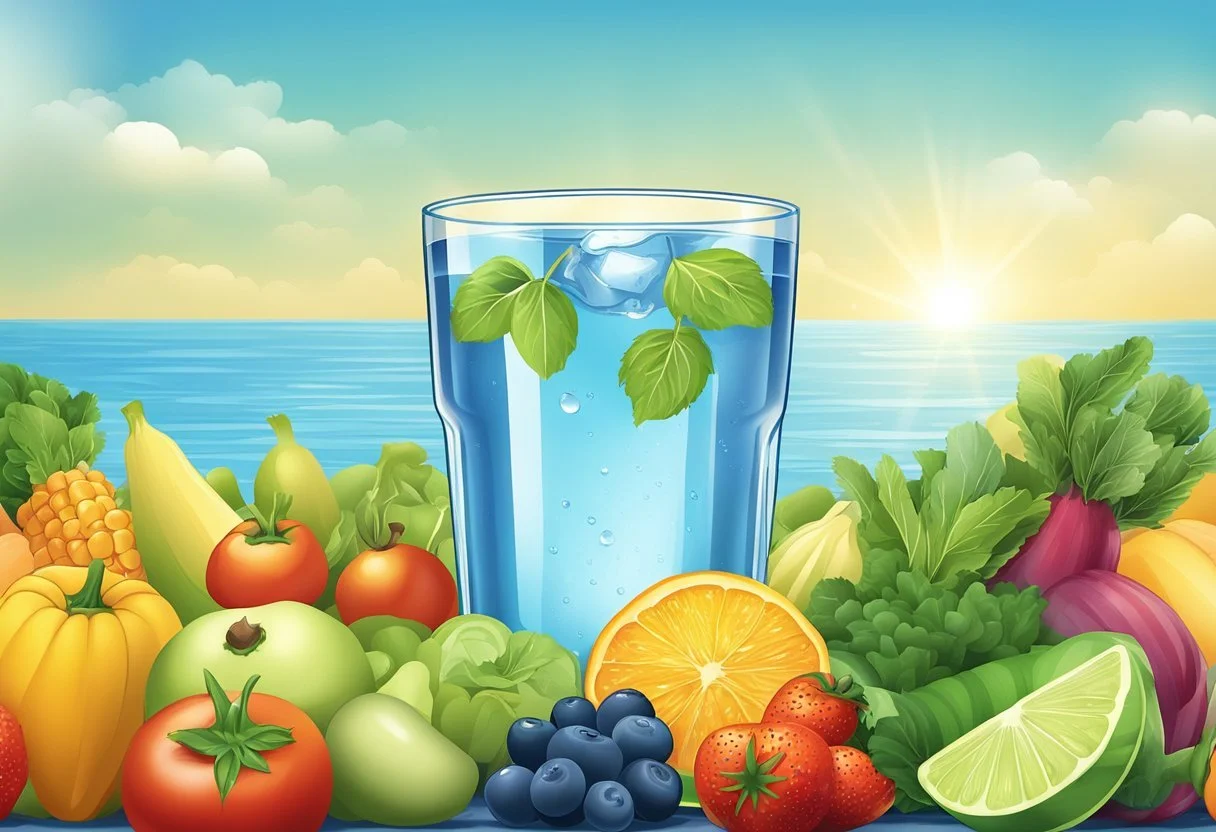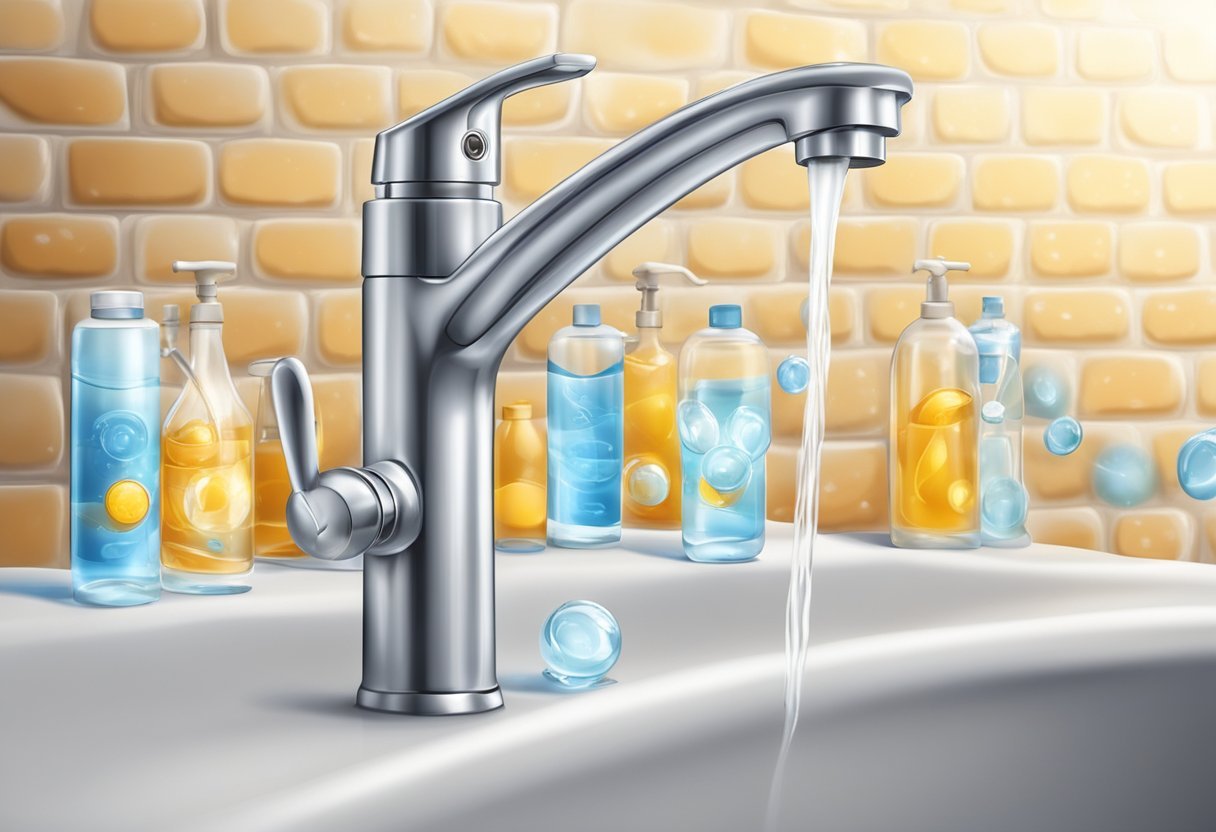Does Drinking Water Help Allergies?
Uncovering the Science and Facts
This article is part of our series on Natural Health
Discover > Natural Health > Does Drinking Water Help Allergies?
Allergies can significantly affect our daily lives, causing symptoms ranging from mild itching and sneezing to severe respiratory issues. With the constant search for natural remedies that can reduce or alleviate these symptoms, many people wonder if something as simple and accessible as drinking water can help combat their allergies.
Water is known for its numerous health benefits, and staying hydrated is vital for maintaining overall physical and mental well-being. When it comes to allergies, hydration can potentially aid in alleviating symptoms by thinning mucus in the nasal passages and supporting the body's natural detoxification processes. This may contribute to a reduction in congestion and improvements in sinus-related discomfort.
Although water intake alone cannot cure allergies, incorporating proper hydration into a well-rounded treatment plan may be beneficial for managing allergy symptoms. It is essential to keep in mind that each person's experience with allergies is unique, and individual responses to remedies, including increased water intake, may vary.
Understanding Allergies
Allergies occur when the immune system mistakenly identifies a harmless substance, known as an allergen, as a foreign intruder. The body then mounts a defense against the allergen, leading to an allergic reaction. The most common substances triggering allergies include pollen, mold, dust mites, animal dander, and certain foods.
The immune system responds to allergens by producing histamine, a chemical responsible for many of the symptoms associated with allergic reactions. Histamine causes blood vessels to dilate and increases mucus production, leading to symptoms such as itching, redness, and swelling. For those with seasonal allergies, also known as hay fever or allergic rhinitis, these symptoms can be particularly uncomfortable and disruptive.
Allergies can affect anyone, though they are more prevalent in children. The risk of developing allergies tends to run in families, but environmental factors also play a role. Allergy symptoms can vary in severity, ranging from mild to severe. In extreme cases, an allergic reaction can lead to anaphylaxis, a life-threatening condition requiring immediate medical attention.
Considering the various types of allergens, here is a breakdown for better understanding:
Pollen: Released from plants and trees, airborne pollen is a prime cause of seasonal allergies.
Mold: Thriving in damp areas, mold spores can trigger allergic reactions year-round.
Dust Mites: Microscopic creatures living in household dust, they can cause year-round allergies.
Animal Dander: Particles from pet skin, saliva, and urine can cause allergic reactions.
Foods: Peanuts, tree nuts, milk, eggs, soy, wheat, and shellfish are among the most common food allergens.
In conclusion, understanding allergies involves recognizing the immune system's response to allergens, the presence of histamine, and common allergy triggers. Educating oneself on the various factors contributing to allergic reactions can help identify potential allergens and manage symptoms effectively.
Role of Hydration in the Body
The human body largely consists of water, making proper hydration essential for overall health and well-being. The recommended water intake varies, but a commonly suggested amount is about 60 ounces of water daily. This is because water plays a significant role in various bodily functions, such as:
Regulating body temperature
Lubricating joints
Protecting organs and tissues
Transporting nutrients and oxygen
Flushing waste products
Dehydration and Allergies
When an individual doesn't consume adequate drinking water, they may experience dehydration. Dehydration can affect vital organs, mental functions, and immune system responses, which in turn, are crucial in managing allergies.
In relation to allergies, the connection between water and our body's defense mechanisms is crucial. Dehydration may lead to the production of histamines, chemicals responsible for allergy symptoms like sneezing, itching, and nasal congestion. Ensuring proper hydration may help reduce the release of histamines, which can ultimately help alleviate allergy symptoms.
Rehydration and Managing Allergies
Aim to maintain a consistent water intake throughout the day to promote good hydration and overall health. Some tips to increase water consumption include:
Carry a water bottle and refill it regularly
Incorporate water-rich foods, such as fruits and vegetables, into your daily meals
Set reminders on a smartphone to drink water at regular intervals
It is essential to note that an individual's water needs depend on factors like age, sex, body weight, and activity level. Therefore, it is necessary to monitor your body's hydration levels and make adjustments accordingly.
Water and Allergy Symptoms
Drinking water can play a significant role in alleviating allergy symptoms. By understanding the relationship between water and the histamine response, one can better manage their symptoms such as runny nose, itching, sneezing, nasal congestion, watery eyes, rash, hives, and itchiness.
Increased histamine levels in the body often cause allergy symptoms. Histamines are naturally occurring chemicals in the body that are released as part of the immune system's response to allergens. Water helps to dilute histamine levels, thus reducing the severity of allergy symptoms.
In addition to diluting histamine, staying hydrated has the following benefits:
Hydration supports healthy mucus production, which aids in keeping nasal passages moist and functioning correctly. Properly functioning nasal passages can help alleviate symptoms such as nasal congestion and a runny nose.
Water assists in flushing allergens out of the body, both through urine and by supporting the function of the lymphatic system. This is particularly helpful in reducing itchiness, rashes, and hives.
It's important to note that drinking water should be used as a complementary measure to help manage allergy symptoms, not as a sole treatment method. Consulting a healthcare professional to discuss one's specific allergy and potential treatments is essential.
While staying hydrated can be an effective approach to reducing allergy symptoms, individuals should also be mindful of water quality. Consuming water that contains allergens or contaminants may inadvertently exacerbate symptoms. Ensuring the water source is clean and free of allergens can further support the positive impact of hydration on allergy-related issues.
Water as an Irritant Remover
Water plays a significant role in alleviating allergy symptoms by acting as an irritant remover. Allergy sufferers are often plagued by various irritants, such as pollen, dust, pollutants, and mold. Drinking water can help in flushing out these toxins and providing relief.
One of the primary ways water helps is by promoting proper hydration of mucus membranes. When an individual is well-hydrated, their body can produce a sufficient amount of mucus, which can trap allergens, such as:
Pollen
Dust
Mold spores
Pet dander
This mucus effectively prevents the allergens from entering the respiratory system, thus reducing irritation and discomfort.
Moreover, water supports the body's natural detoxification processes. Drinking an adequate amount of water assists the kidneys in eliminating waste and toxins from the body.
Drinking enough water may also help to thin out mucus secretions, making it easier for the body to expel irritants through coughing or sneezing. This process can provide relief from congestion and other allergy symptoms.
In conclusion, water can act as a powerful irritant remover, providing relief for allergy sufferers by maintaining healthy mucus membranes, trapping irritants, and assisting in the body's natural detoxification process. So, staying hydrated is not only essential for overall health, but also proves to be beneficial in managing allergies.
Water's Impact on the Immune System and Inflammation
Drinking water plays a crucial role in maintaining a healthy immune system. It enables proper functioning of body cells, organs, and tissues. A well-hydrated body promotes the production of lymph, which is responsible for circulating white blood cells, thereby strengthening the body's defense mechanism against allergens and infections.
Water also aids in flushing out toxins and waste, lessening the burden on the immune system. Adequate water intake helps to support a properly functioning digestive system, leading to better nutrient absorption and a stronger immune response.
When it comes to inflammation, water acts as a natural anti-inflammatory agent. The body's inflammation response is triggered when the immune system detects a potentially harmful substance, like allergens or toxins. In such instances, the immune system tries to protect the body by generating an inflammatory response. Water helps facilitate this response and may eventually alleviate allergy symptoms.
Moreover, there is evidence that dehydration can result in increased inflammatory markers. Given that allergies often involve an inflammation response, maintaining proper hydration might be beneficial in reducing allergy symptoms.
To summarize, drinking water is essential for maintaining overall health, and it can positively impact the immune system and inflammation responses. Hence, ensuring adequate water intake might be helpful in managing allergies. However, it is crucial to understand that while proper hydration may alleviate allergy symptoms, it may not cure allergies entirely. A comprehensive approach, including medication, managing environmental triggers, and maintaining a healthy lifestyle, should be considered for effective allergy management.
Effect of Water on Skin Allergies
Drinking water may have an indirect positive impact on skin allergies, as proper hydration is essential for maintaining healthy skin. Good hydration helps the skin act as a barrier against allergens and irritants that cause symptoms like rashes and hives. Moreover, adequate water intake fosters optimal immune system function that can affect the body's response to allergens.
However, it's essential to note that drinking water isn't a direct treatment for skin allergies. Staying hydrated supports overall health, but it might not significantly alleviate symptoms associated with specific skin conditions.
In a few rare cases, contact with water causes a skin allergy, a condition known as aquagenic urticaria. The individuals affected by this disorder experience hives or a rash after exposure to water, and symptoms often last for a short period. Aquagenic urticaria is not directly related to whether a person is well-hydrated or not.
In summary, consuming water is good for maintaining overall skin health and ensuring proper immune system functionality. While hydration isn't a direct treatment for skin allergies, it can offer benefits by supporting a robust immune response. However, it's important to recognize the rare cases of aquagenic urticaria, in which water contact may cause skin allergy symptoms.
Water Role in Food Allergies
Water plays a vital role in managing food allergies and food-related allergies. It is important to understand the relationship between water intake and the reduction of allergic symptoms. Adequate hydration helps the body to function optimally and strengthens the immune system.
In the context of food allergies, water has several key functions:
Diluting Allergens: Drinking water can help dilute allergens present in the gastrointestinal tract. By doing so, it reduces the concentration of allergens and lowers the chances of an allergic reaction.
Aiding Digestion: Proper hydration is necessary for healthy digestion. Drinking enough water aids in breaking down food and absorbing nutrients, which in turn may reduce the severity of an allergic reaction.
Flushes Out Toxins: Water assists the body in eliminating toxins and waste products, which can contribute to inflammation and the exacerbation of allergy symptoms.
Moreover, it is important to stay well-hydrated for overall health, as dehydration can lead to numerous health issues, including exacerbating food-related allergies. Dehydration weakens the body's natural barriers, making it more susceptible to harmful substances and may escalate symptoms stemming from food allergies.
To maintain adequate hydration, it is recommended to consume 8-10 glasses of water daily. However, individual water needs vary depending on factors such as age, weight, activity level, and climate. Alongside plain water, hydration can also be achieved through sources like herbal teas, fruits, and vegetables that have high water content.
In conclusion, staying well-hydrated plays an essential role in managing food allergies and food-related allergies. Drinking an adequate amount of water helps to dilute allergens, aids digestion, and flushes out toxins from the body. To minimize allergy symptoms and boost overall health, it is essential to maintain proper hydration.
Water, Allergies and Healthy Lifestyle
Water plays a crucial role in maintaining a healthy lifestyle. It is essential for various bodily functions and can also help alleviate allergy symptoms. Drinking water can help by hydrating the body, thinning mucus in the nasal passages, and reducing inflammation.
Regular exercise is another essential component of a healthy lifestyle. Studies have shown that incorporating moderate to intense exercise into one's daily routine can help improve allergy symptoms in the long run. Combining exercise and sufficient water intake can result in an even more effective approach to allergy management. Here are some ways water can improve allergy symptoms:
Thinning mucus: Drinking water helps to hydrate the body, resulting in thinner mucus in the nasal passages. Thinner mucus is easier to expel, providing relief from nasal congestion.
Reducing inflammation: Adequate water intake helps flush out allergens and toxins from the body, which can help reduce inflammation associated with allergies.
Boosting immune system: Staying hydrated is necessary for the proper functioning of the immune system, as it relies on the body being adequately nourished and hydrated. A strong immune system can better manage and combat allergies.
To ensure an allergy-friendly exercise routine, consider the following tips:
Choose an appropriate workout environment: Opt for indoor workouts during high pollen count days or when air pollution levels are elevated.
Moderate to intense exercise: Incorporate a mix of aerobic exercises, strength training, and stretching into your fitness routine.
Stay hydrated: Drink sufficient water before, during, and after exercising to prevent dehydration and maintain optimal body function.
In conclusion, adopting a healthy lifestyle by staying well-hydrated and engaging in regular exercise can contribute to improved allergy symptoms. Focusing on these aspects can result in a better quality of life and overall well-being for allergy sufferers.
Adverse Effects of Inadequate Water Intake
Dehydration is a significant concern when it comes to inadequate water intake. It occurs when the body loses more fluids than it takes in, leading to an imbalance in its overall water content. Dehydration can negatively impact various bodily functions, and in the context of allergies, it can exacerbate symptoms.
One primary effect of dehydration on allergies involves the production of mucus. Mucus is essential for trapping allergens and keeping the respiratory system clean. However, when the body is dehydrated, mucus becomes thicker and stickier. This change in its consistency can cause the mucus to get trapped in the sinuses, leading to congestion and difficulty breathing.
Sinus issues can be further aggravated by dehydration. The sinuses rely on proper hydration to maintain their cleansing function. When the body lacks water, the sinuses may become dry and irritated, causing inflammation and discomfort. Furthermore, inadequate hydration can decrease the efficacy of the cilia, small hair-like structures in the sinuses responsible for clearing mucus and allergens.
Inadequate water intake can also affect the immune system. The body requires a sufficient amount of water to properly function, and a weakened immune system due to dehydration may struggle to ward off allergens. This susceptibility can lead to an increase in allergic reactions and symptoms.
In summary, staying adequately hydrated is essential for proper bodily functioning, including the management of allergies. By drinking an appropriate amount of water, individuals can help to alleviate allergy symptoms and maintain overall good health.
How Other Drinks Influence Allergies
When managing allergies, it is essential to consider how different beverages might impact the symptoms. While water is the ideal choice, other liquids may either alleviate or exacerbate the condition. This section explores the potential effects of caffeine and sodas on allergies.
Caffeine, commonly found in drinks like coffee, tea, and some energy drinks, may have some influence over allergies. Evidence suggests that it could act as a mild bronchodilator, temporarily opening up airways in people experiencing allergic reactions. This may provide relief for respiratory symptoms like shortness of breath, coughing, and wheezing.
Pros of caffeine:
Might open up airways
Can alleviate respiratory symptoms temporarily
However, it is essential to note that excessive caffeine consumption might lead to unwanted side effects, such as increased heart rate, anxiety, and gastrointestinal issues. Moreover, it is not a long-term solution for allergy management.
Sodas, on the other hand, may worsen allergy symptoms, particularly for those containing artificial additives, and high levels of sugar. For instance, sweetened beverages might trigger an inflammatory response in the body and cause nasal symptoms like congestion and sneezing to worsen.
Drawbacks of sodas:
Artificial additives
High sugar content
May trigger inflammatory responses
Potential to worsen nasal symptoms
Furthermore, carbonated drinks may cause gastrointestinal discomfort, affecting the overall well-being of individuals with allergies.
In conclusion, while water remains the top choice for allergy sufferers, it is crucial to recognize the way other drinks can influence symptoms. Caffeine might provide short-term relief for respiratory symptoms, but should be consumed in moderation. Sodas, conversely, can potentially exacerbate allergy symptoms due to their artificial additives and high sugar content. It is crucial for individuals with allergies to be cautious and make informed decisions about their beverage choices.
Consulting a Medical Professional
When experiencing allergies, it is crucial to consult a medical professional, especially if symptoms are severe or persistent. Allergies can range from mild annoyances to life-threatening conditions, and a doctor's guidance is essential in managing them effectively.
Severe allergic reaction: In cases of severe reactions, individuals may experience symptoms such as difficulty breathing, chest pain, and swelling of the throat, face, or tongue. These severe reactions require immediate medical attention, as they may lead to anaphylactic shock or anaphylaxis.
Anaphylactic shock: This is a serious and life-threatening condition caused by an allergic reaction. Symptoms include rapid or weak pulse, confusion, shortness of breath, and a drop in blood pressure. If you or someone you know is experiencing these symptoms, seek emergency medical assistance immediately.
Anaphylaxis: This is the most severe form of an allergic reaction. In addition to the symptoms mentioned above, anaphylaxis can lead to dizziness, nausea, vomiting, and loss of consciousness. Emergency treatment is necessary to address this severe condition.
When consulting with a medical professional, it is important to provide a detailed medical history, including any known allergies, previous reactions, and any at-home treatments that have been attempted. This helps the doctor in devising an appropriate treatment plan.
Additionally, here are a few items to discuss with your medical professional:
Specific allergy triggers
Prevention strategies
The benefits of allergy medication
The role of hydration in managing allergies
In conclusion, consulting a medical professional is a key step in addressing allergies. Timely intervention can prevent severe allergic reactions and help individuals lead a comfortable life. So, while drinking water may provide some relief, it is essential to seek professional guidance for allergy management.
Quality of Drinking Water
When considering if drinking water can help alleviate allergies, it's essential to examine the quality of the water being consumed. The contents of the water supply can vary depending on the source and treatment processes. This section will discuss the factors affecting water quality, such as water supply, water delivery, chlorine, fluoride, minerals, and electrolytes.
Water supply plays a crucial role in determining the quality of drinking water. Factors such as source, regional differences in water treatment, and the presence of contaminants can cause variations in water composition. It is common for municipal water supplies to undergo chlorination, a process that removes harmful microbes from the water. However, some studies suggest that chlorine byproducts, such as trihalomethanes, could cause respiratory allergies in sensitive individuals.
Fluoride is another chemical typically added to tap water, aiming to reduce dental cavities. While the benefits of fluoride are widely accepted, its role in allergy development or exacerbation remains inconclusive.
A well-balanced water also contains minerals and electrolytes, such as calcium, magnesium, and sodium, which can impact its quality and taste. In certain cases, mineral-rich water, also known as "hard water," can lead to skin irritation and exacerbate eczema in individuals with allergies. On the other hand, some studies indicate that mineral-rich waters may have anti-inflammatory effects and could benefit those suffering from chronic respiratory conditions like asthma.
The water delivery system – including pipes, tanks, and faucets – can influence water quality as well. Old or deteriorating infrastructure can introduce contaminants like lead and other harmful substances into the water, which may trigger or aggravate allergic reactions. Moreover, the materials used in the water delivery system can affect the taste, odor, and overall quality of water.
In summary, the quality of drinking water can have an impact on allergies and their severity. Variations in the water supply, water delivery, and treatment process can lead to the presence of different chemicals, minerals, and electrolytes in the water, which can influence the allergic response of sensitive individuals.
Embracing Natural Remedies for Health and Wellness
As more people seek natural solutions for their health concerns, the use of chest rubs for congestion has become a popular topic. Natural chest rubs, often made with ingredients like eucalyptus and peppermint essential oils, can provide relief from congestion and support easier breathing, offering a comforting alternative to over-the-counter remedies.
Pregnancy can bring about various health challenges, including constipation. Many expectant mothers are interested in home remedies for constipation during pregnancy. Simple solutions such as increasing fiber intake, staying hydrated, and gentle exercises can help alleviate discomfort without the need for medication.
Eczema, a common skin condition, can be particularly challenging to manage. For those seeking natural alternatives, healing eczema naturally is a priority. Emollients like coconut oil, oatmeal baths, and aloe vera can offer soothing relief, while avoiding potential irritants and allergens can help manage symptoms.
In the realm of skincare, the trend of creating hydrating face masks at home has gained traction. DIY face masks using natural ingredients such as honey, yogurt, and avocado can provide deep hydration and nourishment, promoting healthy and radiant skin without the use of harsh chemicals.
As the interest in natural health and wellness continues to grow, exploring these topics and embracing natural remedies can empower individuals to support their well-being in a holistic and sustainable way.
#histamine reaction #body's natural histamine response #water and food allergies #serious allergic reactions #thin the mucus #properly hydrated #sinus drainage #body's inflammation responses










